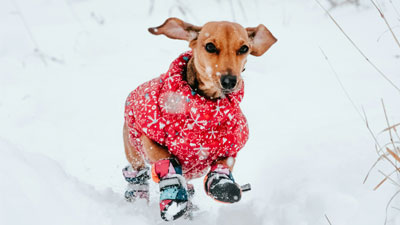- Size
- Smallest
- Small
- Small to Medium
- Medium
- Large
- Giant
- Characteristics
- Smartest
- Hypoallergenic
- Fluffy
- Best Guard
- Best Family
- Best for Kids
- Low Shedding
- Healthiest
- Police Dogs
- Most Calm
- Quietest
- Color
- White
- Black
- Grey
- Brown
- Blue
- Red
- Coat
- Hairless
- Short
- Long
- Origin
- Japan
- China
- Australia
- Germany
- Italy
- United States
- France
- Group
- Hound
- Terrier
- Herding
- Toy
- Working
- Sporting
Can Humans Transmit Colds To Dogs?

Photo by Matthew Henry on Unsplash
The common cold, a familiar ailment for humans, often prompts pet owners to wonder about the possibility of their dogs catching colds from them. While the bond between humans and their canine companions is undeniably close, the transmission of cold viruses between the two species is a nuanced aspect of veterinary and human health.
In this comprehensive exploration, we delve into the dynamics of canine health, the nature of cold viruses, and the likelihood of dogs contracting colds from their human counterparts.
The Distinct Nature of Canine Health
Dogs, like humans, can experience a range of health conditions, including respiratory infections that manifest as symptoms akin to the common cold. Sneezing, coughing, nasal congestion, and lethargy are among the signs that may raise concerns for pet owners. However, it's important to note that the viruses causing these symptoms in dogs are typically specific to their species.
Canine respiratory infections can be attributed to various viruses, such as the canine adenovirus, canine parainfluenza virus, and canine coronavirus. These viruses are adapted to infect dogs and are not the same as the viruses responsible for human colds. This distinction forms a natural barrier, reducing the likelihood of cross-species transmission.
Unlikely Transmission of Human Colds to Dogs
The transmission of cold viruses from humans to dogs is considered highly improbable. The unique genetic makeup of viruses dictates their host specificity, limiting their ability to jump between species. While zoonotic diseases exist, the viruses causing common colds in humans and dogs generally remain within their respective host populations.
The respiratory systems of humans and dogs differ in their anatomical and physiological aspects, further reducing the potential for virus crossover. The intricate interactions between viruses and host cells, known as host-virus tropism, contribute to the specificity of infections. This means that viruses adapted to humans are less likely to effectively infect and replicate within canine cells.
Understanding Zoonotic Transmission
Zoonotic diseases are those that can be transmitted between animals and humans. While certain diseases fall under this category, the common cold viruses are not prominent examples. Zoonotic transmission is often associated with specific pathogens that have evolved mechanisms to infect both humans and animals.
For instance, diseases like rabies, influenza, and certain gastrointestinal infections can be zoonotic. These diseases have undergone adaptations that allow them to overcome species barriers, leading to potential transmission between humans and animals. However, the common cold viruses typically lack these adaptations, making interspecies transmission less common.
Can Dogs Be Affected by Other Respiratory Infections?
While the transmission of human colds to dogs is unlikely, it's crucial for pet owners to be aware of other respiratory infections that can affect their canine companions. Conditions such as kennel cough and canine influenza are examples of respiratory illnesses that can spread among dogs.
Kennel Cough: Kennel cough is a highly contagious respiratory infection characterized by a persistent, dry cough. It is often seen in environments where dogs are in close proximity, such as boarding facilities, dog parks, or grooming salons. Despite the term "kennel cough," dogs can contract this infection in various settings.
Canine Influenza: Canine influenza, or dog flu, is another respiratory illness that affects dogs. It is caused by influenza viruses adapted to infect dogs specifically. Dog flu can spread rapidly in places where dogs congregate, and symptoms may include sneezing, coughing, runny nose, and fever.
These infections are examples of illnesses that can be transmitted among dogs but are distinct from the common cold viruses affecting humans.
Precautions and Hygiene Practices
While the risk of dogs catching colds from humans is low, responsible pet ownership involves maintaining good hygiene practices to ensure the well-being of both pets and owners. Here are some considerations:
Handwashing:
Practicing regular handwashing, especially after coughing or sneezing, can prevent the potential spread of any pathogens.
Limiting Close Contact:
If a pet owner is unwell, minimizing close contact with their dog during the period of illness can reduce any possible exposure.
Routine Veterinary Care:
Regular veterinary check-ups and vaccinations are essential for maintaining the overall health of dogs. Vaccines protect against specific canine viruses, contributing to the prevention of respiratory infections.
Environmental Hygiene:
Maintaining a clean living environment for dogs, including their bedding and toys, helps minimize the risk of various infections.
Conclusion
In conclusion, the likelihood of dogs catching colds from humans is remote due to the inherent specificity of viruses and the distinct nature of the respiratory systems in different species. While responsible hygiene practices are advisable, pet owners can rest assured that their canine companions are not highly susceptible to common cold viruses circulating among humans.
You May Also Like
 Dog Health10 Natural Remedies for Treating a Dog with a Cold
Dog Health10 Natural Remedies for Treating a Dog with a Cold Dog HealthDog Cold vs. Kennel Cough: What's the difference?
Dog HealthDog Cold vs. Kennel Cough: What's the difference? Dog HealthExploring Canine Cold Tolerance: How Low Can Dogs Go?
Dog HealthExploring Canine Cold Tolerance: How Low Can Dogs Go? Dog HealthHow Long Does It Take A Dog To Show Signs Of Parvo?
Dog HealthHow Long Does It Take A Dog To Show Signs Of Parvo? Dog HealthCan I Give Human Amoxicillin To My Dog?
Dog HealthCan I Give Human Amoxicillin To My Dog? Dog HealthWhat Happens If A Dog Eats Amoxicillin?
Dog HealthWhat Happens If A Dog Eats Amoxicillin?